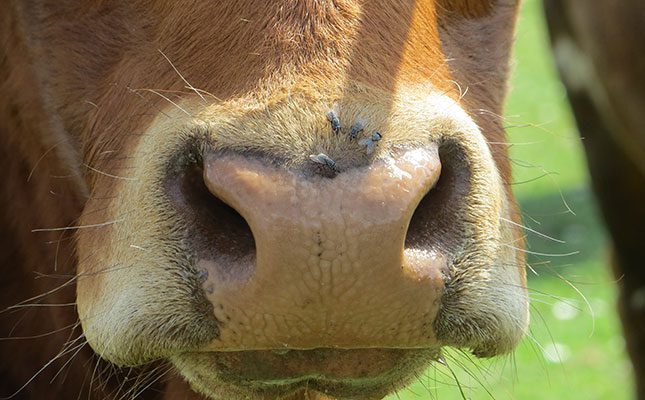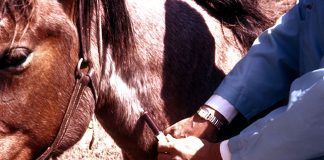
Research shows that about 65 different diseases can be caused or spread by flies. A wet summer (such as in 2021/22 and 2022/23) creates the ideal conditions for flies to breed in large numbers.
Houseflies
Most farmers would regard the stable fly as more dangerous than the housefly, but this in fact not the case. While stable flies cause irritation by biting animals and can result in some health problems when there are many of them, the common housefly is the most prevalent vector (carrier) of serious diseases. These include the following:
- Salmonellosis
This can result in serious problems such as diarrhoea and can even lead to abortions in pregnant animals. - Pinkeye
This must be treated with an antibiotic eye powder. If you ignore the problem, the animal will be in constant pain and will therefore not eat enough. It may even go blind, which will lower its value. - Tuberculosis (TB)
TB causes lesions in the lungs and lymph nodes. It is highly contagious and potentially fatal. - Botulism
Flies spread this disease from infected carcasses to healthy animals. Botulism causes the muscles to waste away and is often fatal.
Green bottle flies
These flies are responsible for flystrike, a condition that affects mainly wool and dual-purpose sheep. The female flies lay hundreds of eggs in the tail area of the sheep, which is moist from urine. The maggots that hatch then burrow into the flesh of the sheep, resulting in dangerous infection and a foul smell.
Under very rainy conditions, these flies may lay their eggs anywhere on the body, particularly where there is a small open wound.
To prevent flystrike, you need to ‘crutch’ the sheep: that is, shear the wool from around the anus, female genitals, and tail area. This must be done very carefully to avoid hurting the animal.
At the earliest sign of discomfort to the sheep, use dips to kill the maggots and larvicide as a follow-up treatment. Sheep that have already developed maggot wounds should be treated at least twice with a long-acting antibiotic injectable (seven days apart).
Prevention
It’s impossible to totally eradicate flies on a farm, but you can reduce their numbers without harming the environment. Avoid the use of fly sprays; they contain chemicals that are toxic to people, the environment, and beneficial insects, and they won’t even get rid of the flies! Here are better solutions:
Flytraps
Most farmer supply stores sell plastic ‘fly catchers’ that can be filled with bait and hung up near sheds or other buildings.
Hang these in a covered area to protect them from rain and wind. Read the baiting instructions properly and ensure that the prevailing wind doesn’t blow the bad smell from the traps into your home. The rafters in a shed or tree branches are good options.
If you have a severe fly problem, you will need to empty the traps and rebait them regularly.
Granular bait
This is a poisonous bait that attracts flies and then kills them. Scatter the granules onto window sills (again sheltered from rain and wind) or directly onto manure heaps, a favourite place for flies to lay their eggs.
Larvicide
This also comes in granular form and is added to livestock feed. While harmless to animals, it makes their their faeces toxic to fly maggots, breaking the insect’s life cycle.
Paint-on remedies
These are mixed with water and painted onto places such as the ceilings of sheds and on the inside of window panes and sills. They work well because they contain fly hormone attractants and are not affected by rain or wind.
While these methods of control will reduce fly numbers almost immediately, you will need to keep using them to make sure the fly population stays low.
If you have a serious fly problem, use more than one method. Ideally, you should eventually be able to use only fly traps so that you totally avoid any poisonous chemicals.
This will help to protect beneficial insects as well as birds that feed on the flies.
Shane Brody is involved in an outreach programme aimed at transferring skills to communal farmers.










